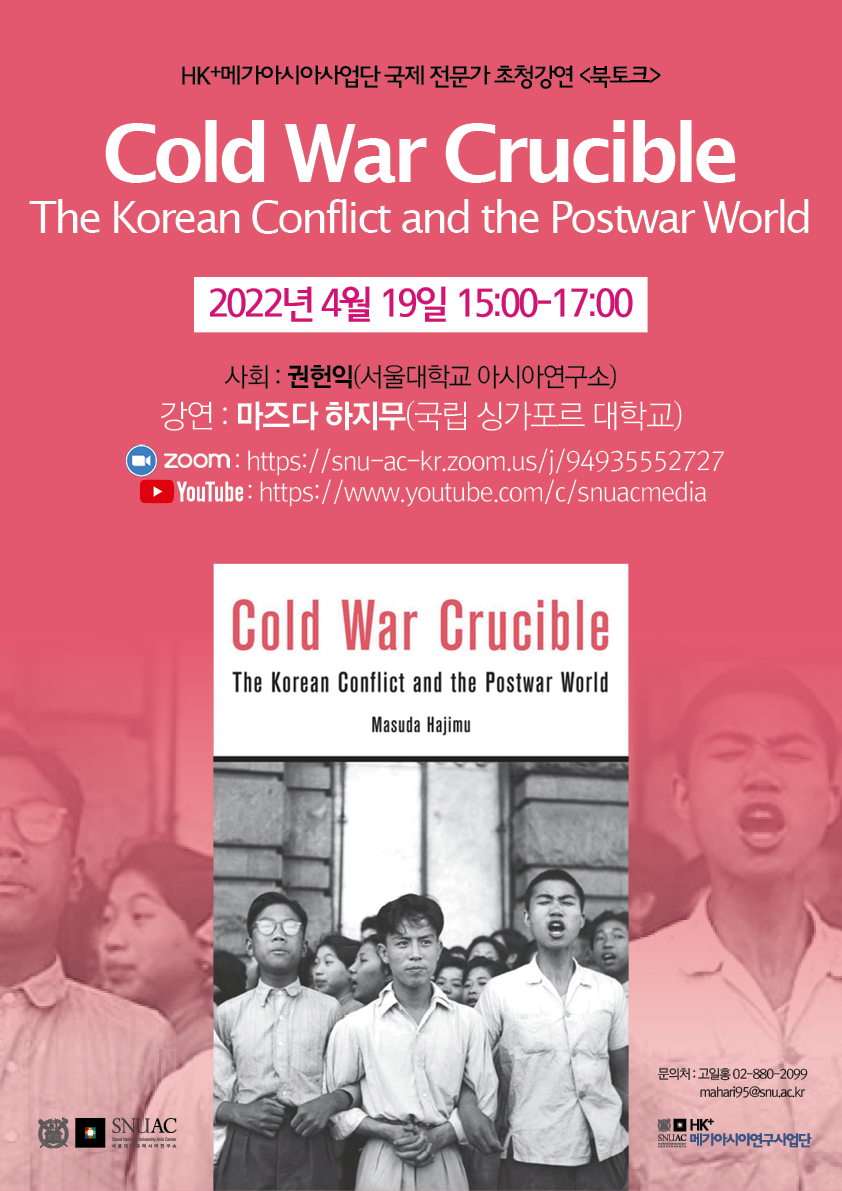Start
2022년 4월 19일 - 3:00 pm
End
2022년 4월 19일 - 5:00 pm
Address
온라인 ZOOM, YouTube 진행
What was the Cold War? Cold War Crucible is an inquiry into the very nature of the conflict. It traces the Cold War’s metamorphosis during the Korean War from a diplomatic stand-off among policymakers to an ordinary people’s war at home through examining not only centers of policymaking, but seeming aftereffects of Cold War politics during the Korean War: The Red Purge in Japan, the White Terror in Taiwan, Suppression of counterrevolutionaries in China, the crackdown on “un-Filipino” activities in the Philippines, and McCarthyism in the United States. While these events have been usually examined separately and are commonly considered aftereffects of the global Cold War, the book re-defines these events as parts of a global phenomenon of nativist backlashes—a sort of social conservative suppression—that operated to silence various “social warfare” that surfaced in the aftermath of World War II. It shows how ordinary people throughout the world strove to silence disagreements and restore social order under the mantle of the global confrontation, revealing that the actual divides of the Cold War existed not necessarily between the Eastern and Western blocs but within each society, with each, in turn, requiring the perpetuation of such an imagined reality to maintain order and harmony at home. Exploring such social functions and popular participation, Cold War Crucible suggests that the Cold War was more than an international confrontation between the Western and Eastern blocs. It was also a social mechanism for purity and order, which functioned in many parts of the world to tranquilize chaotic postwar and postcolonial situations through containing a multitude of social and culture wars at home.
Masuda Hajimu (family name Masuda) is a historian at the National University of Singapore. He is the author of Hitobito no naka no Reisen sekai : sōzō ga genjitsu to naru toki [The Cold War World among Ordinary People: When Imagination Became Reality] (Iwanami shoten, 2021); Cold War Crucible: The Korean Conflict and the Postwar World (Harvard University Press, 2015); “The Early Cold War: Studies of Cold War America in the 21st Century” in A Companion to U.S. Foreign Relations (Wiley Blackwell, 2020); “The Social Experience of War and Occupation” in The Cambridge History of Japan (Cambridge University Press, forthcoming in 2023), among many others. His areas of concentration are the modern history of East Asia, the history of American foreign relations, and the social and global history of the Cold War, with particular attention toward ordinary people and their violence, as well as the recurrent rise of grassroots social conservatism in the globalized world of the twentieth century. He was a residential fellow at the Woodrow Wilson International Center for Scholars (2017-18); Visiting Fellow at the University of Cambridge (2020); and Visiting Scholar at Waseda University (2020). In 2021, he received the 75th Mainichi Shuppan Bunka Sho (The Mainichi Publishing Culture Prize) and the 21st Osaragi Jiro Rondan Prize.
Photo
Review
HK 메가아시아 사업단의 국제전문가 초청 강연의 하나로 마즈다 하지무 선생님의 최근 책 『Cold War Crucible』에 대한 북토크가 2022년 4월 19일 오후 3시부터 4시 30분까지 진행되었다.
권헌익 선생님의 사회하에 하지무 선생님께서는 본인 책에 대한 전반적 요약을 40분 정도 발표하셨고, 이후 책에 대한 Q&A 세션을 가졌다. 이 책에서 하지무 선생님은 냉전 (Cold War)이 어떻게 각 나라마다 다르게 이해되었는지를 우선 설명했다. 구체적으로 2차 세계대전에 직·간접적으로 관여된 국가들 (미국, 중국 등)의 경우, 냉전이 제 3차 세계대전으로 이어질 수 있다는 두려움을 가지고 있었다. 반대로 2차 세계대전에서 한 발짝 떨어져 있었던 국가들 (캐나다, 라틴아메리카 및 아프리카 국가들)은 냉전이 세계 3차 대전으로 이어지지는 않을 것이라 보았다. 서로 다른 냉전에 대한 개념을 소개하면서 하지무 선생님은 어떻게 냉전이 imagined reality로 이해될 수 있는지를 설명했다.
또한 하지무 선생님은 각 국가(혹은 사회)가 어떻게 냉전이라는 개념을 가지고 사회를 통제하고 또 통치하는지를 보여주었다. 예컨대 미국에서는 메커시즘을 통해 반공이데올로기를 확산시켰고, 반대로 중국은 냉전을 이용해 반미정서를 드높였다. 이처럼 각 국은 자신들의 이해관계에 맞게 냉전을 이용했고, 이를 통해 자신들만의 사회적 통치방식을 발전시켜갔다.
이후 이어진 Q&A 세션에서는 일본, 한국, 북한의 냉전 메커니즘이 어떻게 활용되었는지, 나아가 이런 냉전 메커니즘이 어떻게 보다 더 글로벌한 정치경제질서와 연결되는지에 대한 토론이 이어졌다.
마지막으로 권헌익 선생님은 활발한 토론으로 인해 이번 북토크가 더욱 빛날 수 있었다고 말하며 끝을 맺었다.









